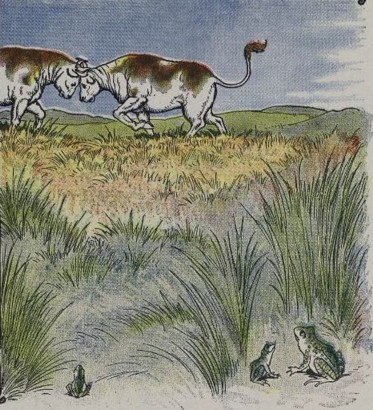PART A_1
Let’s learn vocabulary. Listen and repeat the words and the sentences with your tutor.
PART A_2
| 1. furiously | /FYUR-i-e-sli/ |
| -in a very angry way | |
| The spouses fought furiously over financial matters. | |
| 2. tremble | /TREM-bel/ |
| -to shake slightly, usually because you are cold, frightened, or very emotional | |
| Just hearing the voice of her terror professor makes the girl tremble. | |
| 3. fierce | //firs// |
| -very strong or powerful | |
| The fierce athlete was able to bag all the awards from the competition. | |
| 4. beat | /bit/ |
| -to hit a person or animal repeatedly | |
| The husband casually beats his wife so the latter filed a complaint against the former. | |
| 5. crush | /krash/ |
| -to press something so hard that it is made flat or broken into pieces | |
| The marble was crushed when it was stepped upon by the child’s father. |
PART B_1
Let’s read the story. Please read them aloud, and I will check your pronunciation and intonation.
PART B_2
The Fighting Bulls and the Frog

Two Bulls were fighting furiously in a field, at one side of which was a marsh. An old Frog living in the marsh, trembled as he watched the fierce battle.
“What are you afraid of?” asked a young Frog.
“Do you not see,” replied the old Frog, “that the Bull who is beaten, will be driven away from the good forage up there to the reeds of this marsh, and we shall all be trampled into the mud?”
It turned out as the Frog had said. The beaten Bull was driven to the marsh, where his great hoofs crushed the Frogs to death.
When the great fall out, the weak must suffer for it.
PART C_1
Let’s answer comprehension questions. Please answer them based on the story.
PART C_2
| 1. | Why did the Frog tremble? |
| 2. | Was the Frog’s prediction correct? |
| 3. | What happened to the Frogs? |
PART D_1
Let’s discuss the story. Please answer the questions below and express your opinions.
PART D_2
| 1. | Why do you think the Bulls were fighting? |
| 2. | How do you think the Frog came up with his idea? |
| 3. | What could have happened if the bulls had not fought at all? |
| 4. | Can you think of a situation in real life where the moral of the story is applicable? |
| 5. | In your opinion, are the great obliged to protect or at least do no harm to the weak? Why or why not? |
REVIEW AND FEEDBACK
Now, let us review the things that you learned in this lesson.
ではこのレッスンで学んだことを振り返りましょう。
(Please give a short feedback on how your student did on your class.)
| Grammar 文法 |
Pronunciation 発音 | Vocabulary 単語 |
Comprehension 理解 |
|
|---|---|---|---|---|
 GOOD GOOD |
文法の誤りはほとんどなく、完全な文章で話すことができる | ほとんどの単語をはっきりと正しく発音することができる | 習った表現を適切に使うことができる | 文章を理解し、質問に正しく答えることができる |
 FAIR |
文法の誤りはあるが、完全な文章で話すことができる | 発音の練習が必要な言葉がいくつかある | たまにミスはあるが、習った表現を適切に使うことができる | 文章を完全に理解するのは難しく、質問に正しく答えられないときもある |
 POOR |
文章で話すのは難しく、単語だけで話すことができる | 発音の練習が必要である | 習った単語と表現を少しだけ使うことができる | 文章を理解するのは難しく、質問に答えるのは難しい |
Parts of this lesson material are based on:
An eBook from The Project Gutenberg.
This eBook is for the use of anyone anywhere at no cost and with almost no restrictions whatsoever. You may copy it, give it away or re-use it under the terms of the Project Gutenberg License included with this eBook or online at www.gutenberg.org
An eBook from The Project Gutenberg.
This eBook is for the use of anyone anywhere at no cost and with almost no restrictions whatsoever. You may copy it, give it away or re-use it under the terms of the Project Gutenberg License included with this eBook or online at www.gutenberg.org